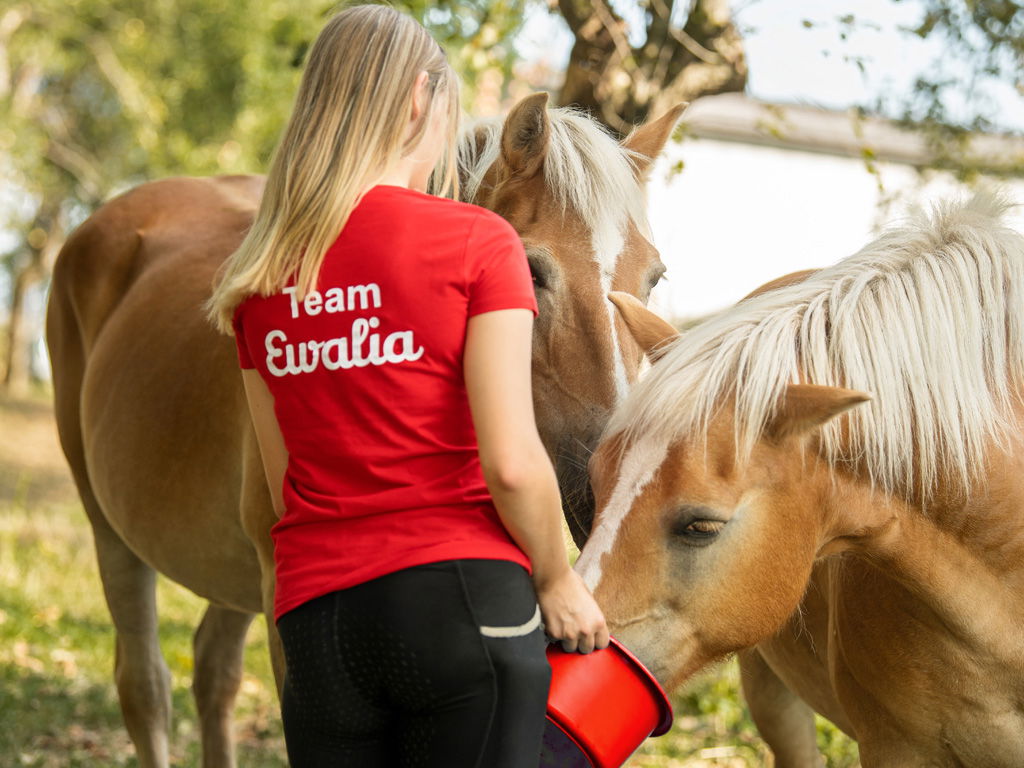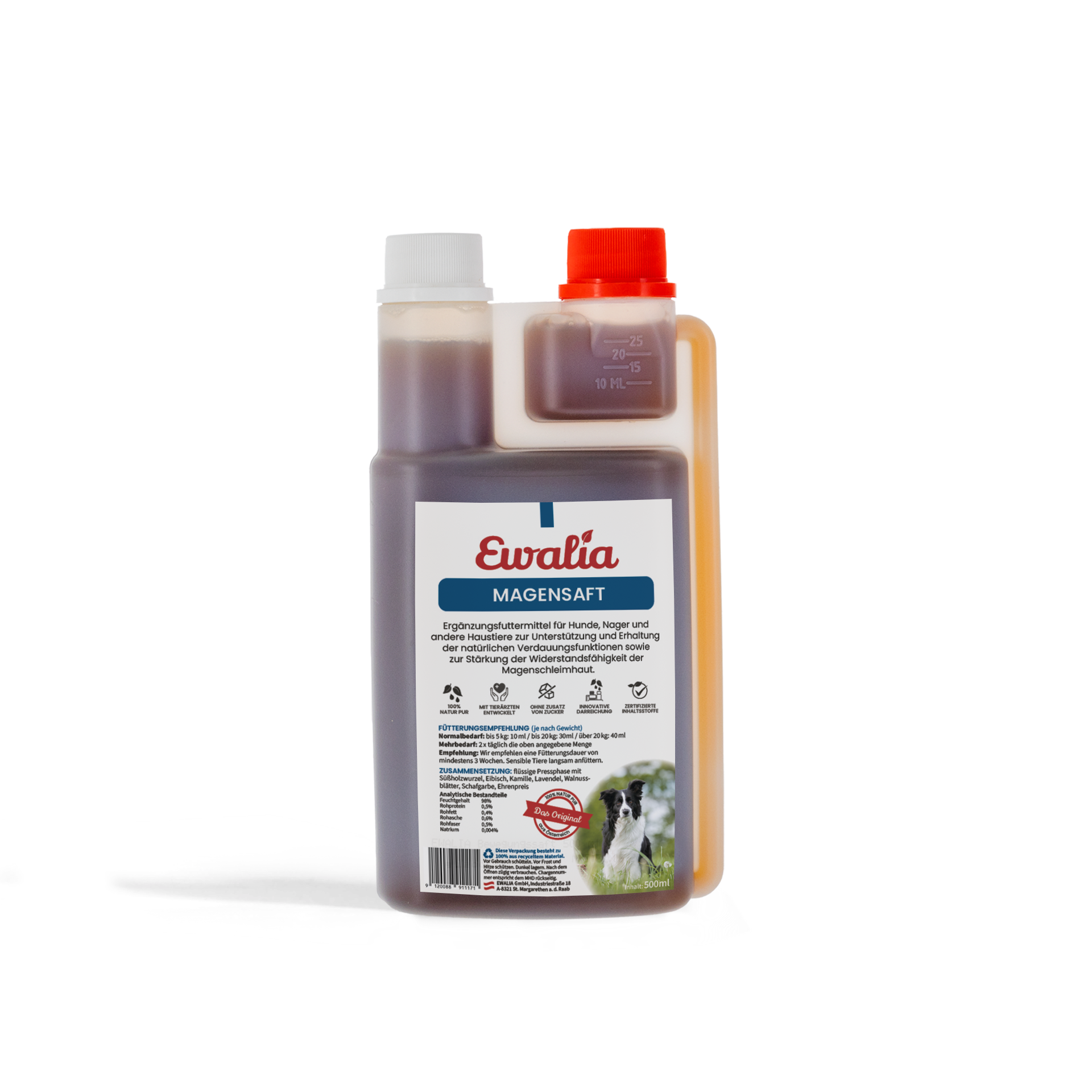What a faecal test can tell you about your dog's health

As any dog owner can tell you, our canine friends will stick their noses in just about anything. This brings them in contact with parasites, bacteria, and sometimes even viruses, all of which can lead to gastrointestinal ailments. A faecal sample examination can find the cause. Learn here how to collect a faecal sample from your dog and what faecal testing can reveal.
How to collect a faecal sample from your dog
When you take your dog for a walk, bring along disposable gloves and a plastic tongue depressor or spoon that you can throw away afterwards. You'll also need either an unused freezer bag or a clean container in which you can store the faecal sample. Many vets have their own stool collection tubes that they give their patients' owners. Using your tongue depressor or spoon, scoop up 10 to 20 grammes of your dog's freshly left faeces and place it in the container. The sample must be collected from fresh faeces to prevent contamination from underground parasites or other creatures. The sample must be kept chilled until it is sent or submitted to your vet (otherwise the results may not be accurate) and labelled with the dog's name and the sample collection date.
For some tests, the lab will need a serial faecal sample, which includes samples collected from over at least three days and bagged and labelled accordingly.
When should faecal testing be carried out?
When the dog suffers from one of the following:
- diarrhoea
- vomiting
- sudden weight loss
If the dog shows signs of any of the above, faecal testing can look for the cause. Because faecal samples are taken from the dog's freshly left faeces, this process is an easy, safe, and non-invasive method for determining a large number of gastrointestinal tract illnesses.
What information does your vet need?
Gastrointestinal problems are a common reason for bringing a dog to the vet. The dog may have simply "found" and eaten something which didn't agree with him and caused diarrhoea or vomiting. But these symptoms can also indicate a serious illness that requires treatment.
Anything that you can tell your vet about the properties of the faecal sample can be important to helping your dog. Therefore make note of the following:
- Quantity of defecation
- Frequency of defecation
- Pain during defecation
- Presence of worms
- Presence of food particles (undigested food)
- Presence of blood
- Consistency (mushy, thin, watery, slimy)
- Colour (more red, yellow, or black)
- Smell
Your information will give the vet a starting point for a diagnosis and will be used in the on-site faecal examination and any lab testing ordered.
What the lab will look for in your dog's faecal sample
Basic laboratory analysis of canine faeces provides an overview of the following:
- Intestinal parasites
- Bacteria and fungi
- Viruses
Special, advanced faecal examinations will look at the following:
- Feed conversion
- Pancreatic enzymes
- Bile acids
- Loss of protein in the bowel
- Inflammation in the bowel
- Imbalances in the gut microbiome
Which intestinal parasites can be found in the dog's faecal sample?
Worms
Roundworms, whipworms, and hookworms are especially dangerous for young dogs and lead to symptoms including diarrhoea, vomiting, and emaciation. Adult dogs often show no signs of worm infestations but may excrete them. The worm eggs spread from the faeces into the surrounding area. These can be detected through special methods that isolate the microscopic parasite eggs in the faeces. Microscopic observation will determine the type of worm.
Note: Testing for tapeworm infestation requires a serial faecal sample!
Single-celled parasites
Single-celled parasites that colonise the bowel can cause severe diarrhoea, especially in young or weak dogs. Testing for the presence of single-celled parasites is done through a serial faecal sample.
- Giardia are quite common. They are found in contaminated water or on dirty surfaces and attach themselves to the coats of other animals, so dogs can get them from just about anywhere. A afflicted dog will excrete up to 10 million eggs in a month; these eggs remain transmissible for about a week to even three months in humid environments.
Note: Giardia can also theoretically be transmitted to humans. - Coccidia infest a dog's intestinal mucosa and can cause acute diarrhoea that is sometimes bloody. Dogs mostly become infected over the faeces of other dogs, but also from eating small rodents or infested meat. Coccidia eggs can survive for months in the environment. Recurrent diarrhoea in young dogs may be caused by coccidia!
- Cryptosporidium ("crypto") parasites are transmitted from other dogs and from contaminated feed, water, or objects. They colonise the dog's small intestine. The eggs are excreted in the faeces and remain infectious for months.
What can a bacterial faecal examination reveal?
Faecal testing for bacteria is carried out when a dog has unexplained diarrhoea. If the dog is fed a BARF diet, the sample should be used to check for an increased occurrence of salmonella, yersinia and campylobacter bacteria, as a raw meat diet carries a higher risk transmitting bacterial infectious agents. An ailing dog should be tested for these germs, especially if it has contact with sick or infirm people, children, or pregnant women, as they can be transmitted to humans.
Salmonella occurs relatively rarely in dogs; puppies and young dogs are particularly at risk. Transmission occurs through ingestion of raw or insufficiently cooked pork, beef or poultry meat or eggs. A dog must ingest a large amount of bacteria to become infected with salmonella, because most of it will be destroyed from low pH environment in the canine stomach.
Campylobacter bacteria are found practically everywhere in the environment. Almost all animal species can carry and spread them without falling ill. However, they can cause diarrhoea and fever in young, stressed, or immunocompromised dogs. Infection occurs through contaminated feed or water, but also from raw meats, eggs, or raw milk, as well as through direct contact with infected animals. The bacteria are mainly excreted with the faeces. Transmission to humans is possible.
Yersinia bacteria cause acute diarrhoea. They are mainly contracted through contaminated pork or raw milk as well as through contaminated water.
Caution: This infection can be transmitted to humans!
Clostridia are gas-forming bacteria that dwell in the soil and can be found in the gut flora of healthy dogs. An overgrowth of these bacteria can cause gas build-up. They also produce toxins that may cause severe diarrhoea and vomiting.
So-called coli-bacteria are a normal part of the dog's intestinal flora. In certain circumstances, such as a weakened immune system or an intestinal flora imbalance, they can overreproduce and damage the intestinal mucosa. Determining the presence of E. coli in canine faeces is possible but not easy.
Yeasts and moulds in a faecal sample indicate an imbalance in the intestinal flora, for example from a faulty diet.
Which viral illnesses are detected through a faecal sample?
Some viral pathogens can cause diarrhoea or problems in the gastrointestinal tract. Frequently detected viruses include parvoviruses and coronaviruses.
Parvovirus (CPV)
Dogs contract CPV over the mouth and nose. Infection causes damage to the intestinal mucosa and is characterised by acute and often bloody diarrhoea. It mainly affects puppies. The pathogens of the dreaded parvovirus are excreted with the dog's faeces and can live in the animal's environment for up to a year.
Canine coronavirus (CCoV)
rarely cause symptoms in adult dogs, at worst mild diarrhoea. However, puppies may experience more severe symptoms with gastroenteritis. Excretion with the faeces generally occurs for less than two weeks.
Can faecal examinations determine organic illness in dogs?
Microscopic examination of the faeces for fat, muscle fibres and starches can reveal signs of poor feed conversion. This kind of examination does not look for a specific disease, but rather can provide an overview of feed conversion in the dog's gastrointestinal tract.
Faecal occult blood
An acute inflammation in the intestine will often cause bleeding in the intestinal epithelium. However, faecal occult blood found in the faecal sample of an apparently healthy dog may be an indication of polyps, ulcers or tumours in the intestine.
Tip: Before collecting a faecal sample to be tested for faecal occult blood, make sure that the dog has not eaten raw meat for three days. Canned dog food should be mixed into noodles or rice. An excess consumption of meat will cause false positives in the results!
Pancreatic illnesses
The detection of canine pancreas elastase 1, a pancreatic enzyme, gives direct indication of pancreatic function. This enzyme is not broken down during passage through the intestine; low levels suggest decreased pancreatic function. The value can still be determined before further blood testing is carried out.
Note: Extremely watery faecal samples are not suitable for testing, as they can give false low values.
Bile acids
Faecal samples can also be used to determine the amount of bile acids. Healthy dogs will have only small amounts of bile acids, excreted with the faeces as end products of liver metabolism. Elevated levels for (total) bile acids in faeces may be caused by a bacterial overgrowth or imbalance in the small intestine.
Loss of protein in the bowel
Protein loss can be determined by evaluating the enzyme α-1 antitrypsin in the faecal sample. Such protein losses are caused by lymphatic drainage disturbances or increased permeability of the intestinal mucosa.
Can faecal testing determine if my dog has a healthy gut microbiome?
A faecal sample can reveal information about the gut microbiome by examining the microorganisms colonising the gut. Imbalances to this microflora will make it unable to nourish and protect the intestinal mucosa. A reduced barrier function of the mucosa can allow endotoxins and histamines to pass from the gut into the body and trigger or intensify disease processes. It also increases the incidence of diseases associated with immunodeficiency.
Molecularbiological analyses of the faecal sample can record the key germs in the gut microbiome to determine any imbalances easily and quickly. An examination of the gut microbiome can help to provide explanations for the following canine ailments:
- unexplained gastrointestinal tract ailments like chronic diarrhoea, flatulence, constipation
- Immune system disorders like feed allergies, atopic dermatitis, coat problems and general immunodeficiencies
- Digestive disorders after treatment with antibiotics
When should faecal testing be carried out?
Faecal testing at regular intervals for parasite control is recommended
- for puppies and young dogs
- for cases of recurring worm infestations
- to provide targeted treatment against the specific worm species (risk of resistance to broad-spectrum wormers!)
- for imported or shelter dogs
- for dogs that have close contact with small children, the infirm (therapy dogs!) or pregnant women – even healthy-looking dogs can have intestinal parasites!
Vets also recommend faecal testing in the case of
- chronic bowel ailments
- recurring unexplained diarrhoea
- immune disorders
Caution: Laboratory faecal testing which you can order yourself cannot replace a visit to the vet! Your vet can use the laboratory results to decide on the best treatment for your dog!
Sources
- https://laboklin.com/fileadmin/FILES/Downloads/infomappen/Mappe_Verdauungsstoerungen_DINA4_2020_X.pdf
- https://www.tiermedizinportal.de/diagnose/kotuntersuchung-bei-tieren/125412
- https://www.aerztezeitung.at/archiv/oeaez-2014/oeaez-17-10092014/zoonosen-hunde-campylobacter-mrsa-e-coli.html
- https://www.tierklinik.de/medizin/erkrankungen-des-verdauungsapparates-bei-hund-und-katze/kotuntersuchung
- https://laboklin.com/at/laboklin-aktuell/details/article/chronische-durchfaelle-flatulenzen-und-rezidivierende-parasitosen-stoerungen-des-darmmikrobioms-bei/
- https://www.tierarzt-talk-time.com/sinnvolle-kot-untersuchungen/
- https://laboklin.com/at/laboklin-aktuell/details/article/pathogene-darmkeime-beim-hund/
- https://parasitenportal.de/wuermer-beim-hund/















